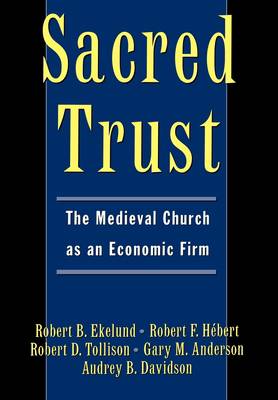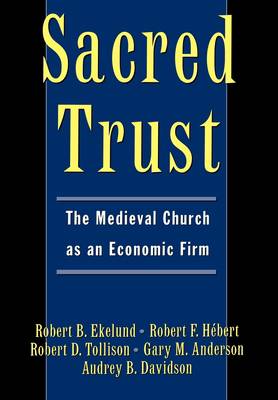
Bedankt voor het vertrouwen het afgelopen jaar! Om jou te bedanken bieden we GRATIS verzending (in België) aan op alles gedurende de hele maand januari.
- Afhalen na 1 uur in een winkel met voorraad
- In januari gratis thuislevering in België
- Ruim aanbod met 7 miljoen producten
Bedankt voor het vertrouwen het afgelopen jaar! Om jou te bedanken bieden we GRATIS verzending (in België) aan op alles gedurende de hele maand januari.
- Afhalen na 1 uur in een winkel met voorraad
- In januari gratis thuislevering in België
- Ruim aanbod met 7 miljoen producten
Zoeken
Sacred Trust
The Medieval Church as an Economic Firm
Robert B Ekelund, Robert F H?bert
Hardcover | Engels
€ 124,45
+ 248 punten
Omschrijving
Without meaning to be irreverent, it is fair to say that in the Middle Ages, at the height of its political and economic power, the Roman Catholic Church functioned in part as a powerful and sophisticated corporation. The Church dealt in a "product" many consumers felt they had to have: the salvation of their immortal souls. The Pope served as its CEO, the College of Cardinals as its board of directors, bishoprics and monasteries as its franchises. And while the Church certainly had moral and social goals, this early antecedent to AT&T and General Motors had economic motives and methods as well, seeking to maximize profits by eliminating competitors and extending its markets.
In Sacred Trust: The Medieval Church as an Economic Firm, five highly respected economists advance the controversial argument that the story of the Roman Catholic Church in the Middle Ages is in large part a story of supply and demand. Without denying the centrality--or sincerity--of religious motives, the authors employ the tools of modern economics to analyze how the Church's objectives went well beyond the realm of the spiritual. They explore the myriad sources of the Church's wealth, including tithes and land rents, donations and bequests, judicial services and monastic agricultural production. And they present an in-depth look at the ways in which Church principles on marriage, usury, and crusade were revised as necessary to meet--and in many ways to create--the needs of a vast body of consumers. Along the way, the book raises and answers many intriguing questions. The authors explore the reasons behind the great crusades against the Moslems, probing beyond motives of pure idealism to highlight the Church's concern with revenues from tourism and the sale of relics threatened by Moslem encroachment in the holy lands. They examine the Church's involvement in the marriage market, revealing how the clergy filled their coffers by extracting fees for blessing or dissolving marital unions, for hearing marital disputes, and even for granting permission for blood relatives to wed. And they shed light on the concept of purgatory, showing how this "product innovation" developed by the Church in the twelfth century--a form of "deferred payment"--opened the floodgates for a fresh market in post-mortem atonement through payments on behalf of the deceased. Finally, the authors show how the cumulative costs that the faithful were asked to bear eventually priced the Roman Catholic church out of the market, paving the way for Protestant reformers like Martin Luther.
A ground-breaking look at the growth and decline of the medieval Church, Sacred Trust demonstrates how economic reasoning can be used to cast light on the behavior of any complex historical institution. It offers rare insight into one of the great historical powers of Western civilization, in a analysis that will intrigue anyone interested in life in the Middle Ages, in church history, or in the influence of economic motives on historical events.
In Sacred Trust: The Medieval Church as an Economic Firm, five highly respected economists advance the controversial argument that the story of the Roman Catholic Church in the Middle Ages is in large part a story of supply and demand. Without denying the centrality--or sincerity--of religious motives, the authors employ the tools of modern economics to analyze how the Church's objectives went well beyond the realm of the spiritual. They explore the myriad sources of the Church's wealth, including tithes and land rents, donations and bequests, judicial services and monastic agricultural production. And they present an in-depth look at the ways in which Church principles on marriage, usury, and crusade were revised as necessary to meet--and in many ways to create--the needs of a vast body of consumers. Along the way, the book raises and answers many intriguing questions. The authors explore the reasons behind the great crusades against the Moslems, probing beyond motives of pure idealism to highlight the Church's concern with revenues from tourism and the sale of relics threatened by Moslem encroachment in the holy lands. They examine the Church's involvement in the marriage market, revealing how the clergy filled their coffers by extracting fees for blessing or dissolving marital unions, for hearing marital disputes, and even for granting permission for blood relatives to wed. And they shed light on the concept of purgatory, showing how this "product innovation" developed by the Church in the twelfth century--a form of "deferred payment"--opened the floodgates for a fresh market in post-mortem atonement through payments on behalf of the deceased. Finally, the authors show how the cumulative costs that the faithful were asked to bear eventually priced the Roman Catholic church out of the market, paving the way for Protestant reformers like Martin Luther.
A ground-breaking look at the growth and decline of the medieval Church, Sacred Trust demonstrates how economic reasoning can be used to cast light on the behavior of any complex historical institution. It offers rare insight into one of the great historical powers of Western civilization, in a analysis that will intrigue anyone interested in life in the Middle Ages, in church history, or in the influence of economic motives on historical events.
Specificaties
Betrokkenen
- Auteur(s):
- Uitgeverij:
Inhoud
- Aantal bladzijden:
- 224
- Taal:
- Engels
Eigenschappen
- Productcode (EAN):
- 9780195103373
- Verschijningsdatum:
- 31/10/1996
- Uitvoering:
- Hardcover
- Formaat:
- Genaaid
- Afmetingen:
- 164 mm x 243 mm
- Gewicht:
- 476 g

Alleen bij Standaard Boekhandel
+ 248 punten op je klantenkaart van Standaard Boekhandel
Beoordelingen
We publiceren alleen reviews die voldoen aan de voorwaarden voor reviews. Bekijk onze voorwaarden voor reviews.









